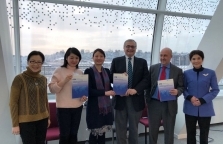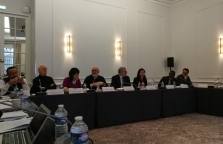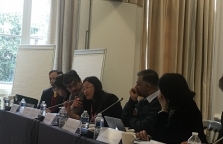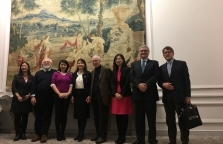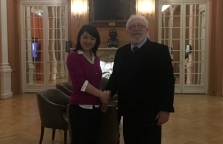Finance Center for South-South Cooperation (FCSSC) successfully co-organized the South-South Co-operation Technical Brainstorming Meeting in Paris from 7 to 9 February 2018, in collaboration with the United Nations Office for South-South Cooperation and the Development Center of the Organization for Economic Co-operation and Development (OECD).
Ms. Joyce Zhang, Deputy Director-General of FCSSC, met Director of OECD Development Center Mr. Mario Pezzini during the sideline of this meeting. To enhance bilateral cooperation between FCSSC and OECD, Mr. Pezzini told Ms. Zhang that FCSSC could cooperate with OECD Development Centre and United Nations Office for South-South Cooperation (UNOSSC) to jointly draft its featured report “Analysis on Countries,” to provide research service to developing countries from the global South, such as Turkey and Argentina.
Mr. Pezzini also expected that both OECD and UNOSSC could participate in the publishing process of FCSSC’s “South-South Cooperation Annual Report,” such that the Director of OECD Development Centre could write the preface for the report. He further pointed out that, as OECD Development Center is supported by a strong network of experts from a wide range of backgrounds, the cooperation could be considered a way to diversify the annual report’s author source.
He told Ms. Zhang that he would like to join FCSSC’s future annual events, such as the “South-South Education Programme for Economics and Finance” and “Belt and Road: Financial Integration and Credit Enhancement” Forum, which will be respectively held in Beijing and Hong Kong. At last, both sides exchanged their views on the South-South Co-operation Technical Brainstorming Meeting and discussed whether the meeting could be held biannually in the future.
On February 7, Ms. Zhang was invited to attend the Presentation of 2017 South-South Cooperation Report: “Changing Roles of South-South Cooperation in the Global Development System: Towards 2030”, where she introduced FCSSC and its annual report to the participants. Not only did she introduce the background and vision of FCSSC to the 28 experts around the globe, but also she emphasized the intention and distinguishing feature of the Report. During the meeting, Dr. Gu Jing, one of the authors of the report from the Institute of Development Studies, was invited to make a presentation on the chapter she wrote.
Specifically, the 50 copies of the Report’s brief edition that Ms. Zhang brought from Hong Kong to Paris became very popular in the participants. FCSSC was asked to send 50 more copies of the Report’s full version.
At the Technical Brainstorming Meeting held on February 9th, Ms. Zhang and FCSSC invited Dr. Gu Jing, Director of the Centre for Rising Powers and Global Development in the University of Sussex, Mr. Jiang Xiheng, Deputy Director of China Center for International Knowledge on Development, Professor Huang Meibo, visiting scholar of the Global Economic Governance Programme at the University of Oxford, and Mr. Richard Carey, former Chairman of the OECD-DAC, discussed in groups on economic, political, environmental, financial, and technological issues.
Ms. Zhang also underlined that both industry research and the building of think tank network are regarded as FCSSC’s priorities. For instance, FCSSC was nominated, along with 40 research institutes from 27 different countries, as well as the United Nations Development Programme (UNDP) and other international organizations, to become a founding member of the “Silk Road Think Tank Network.” Meanwhile, FCSSC also collaborated with Peking University School of Economics to write and edit the Annual Report on South-South Cooperation. The first report, named as “Towards 2030: Changing Roles of South-South Changing Roles of South-South Cooperation in the Global Development System”, was formally published at the United Nations Office in Vienna together with United Nations Industrial Development Organization. “FCSSC will endeavor to strengthen the cooperation with related think tanks as a way to help policymakers in developing countries work out their industrialization plans and corresponding projects,” said Ms. Zhang.
The meeting invited 28 experts with recognized expertise and influence from the industry to exchange views on the role that South-South Cooperation plays in world economic and social development, the multilateral dialogue under the framework, and the solution plans for global governance. Mainly, the meeting acted as a preparatory process of the Second High-Level United Nations Conference on South-South Co-operation (40th Anniversary Conference on the Buenos Aries Plan of Action or BAPA+40 Conference).
Mr. Jorge Chediek, UNOSSC Director and Envoy of the Secretary-General on South-South Cooperation, introduced his organization and then presented the political process surrounding this exercise to include how the discussion was taking place in this meeting, could help and feed the political process towards BUPA+40 Conference. Mr. Mario Pezzini, Director of the OECD Development Center, defined his expectations and dynamics for the meeting and touched on the relevance of South-South Co-operation for development and the 2030 Agenda.
The meeting also involved discussions on the rising importance of developing countries in promoting South-South cooperation, the new modality of SSC in the view of the international community, and the role that BRICS play in contributing to the 2030 Agenda.

